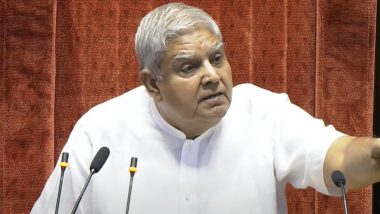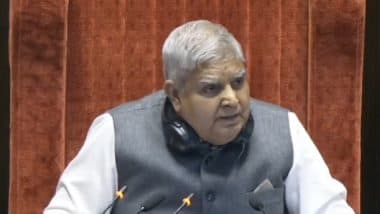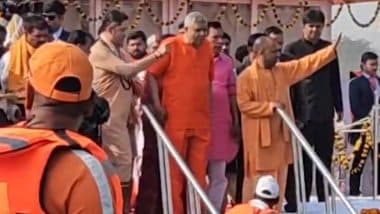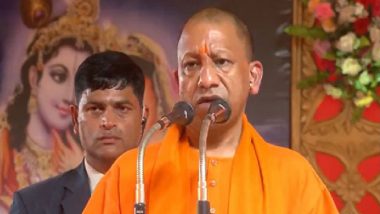New Delhi, August 30: Describing the alleged rape and murder of a doctor at Kolkata's RG Kar Hospital as a "painful" incident, Vice President Jagdeep Dhankhar Friday called for a deterrent ecosystem to punish the perpetrators for such crimes. Referring to President Droupadi Murmu's exclusive article for PTI -- her first statement on the incident -- Dhankhar reiterated her expression, "Enough is enough."
Murmu's hard-hitting and personalised article, titled "Women's Safety: Enough is Enough", was the first time the president articulated her views on the August 9 Kolkata incident that has once again shaken the conscience of the nation and led to widespread, continuing protests. The vice president was addressing students at Delhi University's Bharti College during an event. Kolkata Doctor's Rape-Murder Case: Police Clarify Bike Used by Accused Was Registered Under Commissioner’s Name as Standard Procedure.
Dhankhar also slammed Supreme Court Bar Association (SCBA) president Kapil Sibal for stating in a purported SCBA resolution that the tragic incident was a "symptomatic malaise" and suggesting that such incidents are commonplace. "I am appalled; I am pained and somewhat surprised that someone holding a position in the Supreme Court Bar, a Member of Parliament, acting in a manner and what does he say? A symptomatic malaise and suggested that such incidents are commonplace? What a shame! Words fail me in condemning such a stance. It is doing greatest injustice to the high position," the vice president said.
Ex-SCBA president Adish C Aggarwala had said the resolution was not officially approved by the SCBA Executive Committee and demanded that it be withdrawn or Sibal issue a public apology. Dhankhar condemned the terming of violence against women as "symptomatic malaise" and stressed that such statements were akin to trivialising the suffering of girls.
"For partisan interest? For self-interest? You take a stance, leveraging your authority to perpetrate such kind of heinous injustice on our girls and women? What can be a greater injustice to humanity? Do we trivialise the suffering of our girls? No, not any longer," he said. On President Murmu's remarks, Dhankhar said, "President Murmu is a tribal woman herself. She has seen the ground reality. She rightly expressed in a media note that enough is enough for crime against women. I want this clarion call to be a national call. I want everyone to be a participant in this call." Kolkata Doctor Rape-Murder Case: Mamata Banerjee Led-Government Convenes Special Assembly Session on September 2 To Pass Anti-Rape Bill.
"I want everyone in the country to heed the sane, sage and timely caution by the President of India," he added. Stating that the fear in the minds of girls and women is a cause of concern, Dhankhar said, "How can in the land of Bharat, girls and women be unsafe? How can their dignity be outraged." Referring to the 2012 Delhi gang rape incident, he added that the repeated incidents call for a strong ecosystem to punish the culprits and instil fear in their minds.
Dhankhar also stressed the need for financial independence for women. "I call upon each of you to be financially independent. This is important for you to unleash your energy and potential," he said. "Girls are the most important stakeholders in the development of the nation. They constitute the backbone and spinal strength of the rural economy, agro-economy and informal economy," Dhankhar added.
Highlighting India's current growth trajectory, he stressed that this progress cannot be achieved without the full participation of women, who constitute half of the country's population. "The very thought of India as a developed nation without the participation of girls and women is not rational. They have energy, they have talent. With your participation, the dream of a developed India will be fulfilled before 2047," the vice president remarked.
Dhankhar also slammed "anti-national" narratives against India and called it the biggest challenge to the development of the country. He urged students to keep the national interest above political and ideological differences.













 Quickly
Quickly




















